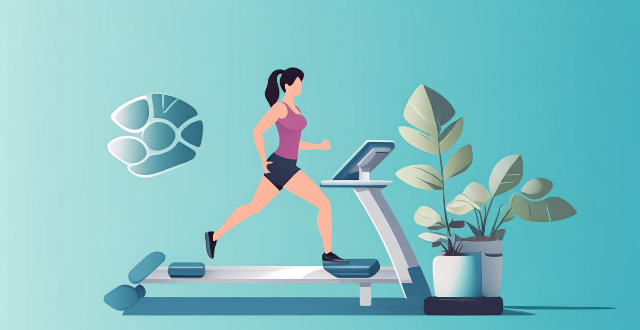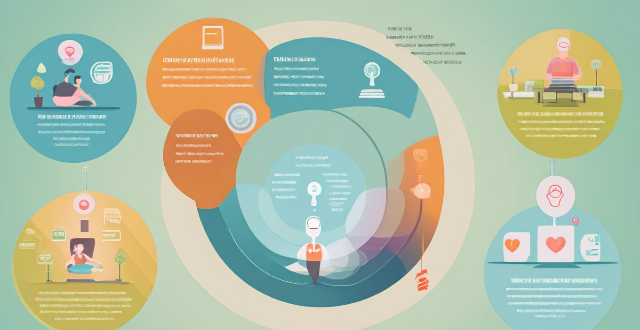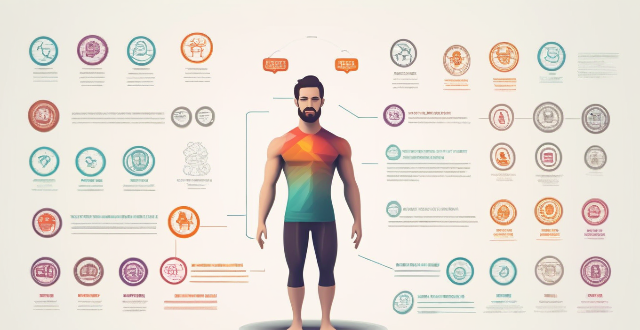Health Sedentary

How does a sedentary lifestyle affect job productivity and overall health ?
This article discusses the negative impacts of a sedentary lifestyle on job productivity and overall health. It outlines how prolonged periods of sitting can lead to decreased energy levels, impaired cognitive function, and increased stress and anxiety in the workplace. It also highlights the increased risk of chronic diseases such as heart disease, diabetes, and obesity, as well as musculoskeletal issues and poor mental health associated with a sedentary lifestyle. The article concludes by emphasizing the importance of incorporating regular physical activity into daily routines and maintaining a healthy work-life balance to improve job performance and overall well-being.

Is there a link between sedentary lifestyle and increased risk of mental health disorders ?
This article explores the link between sedentary lifestyle and increased risk of mental health disorders such as depression, anxiety, and stress-related disorders. It suggests that lack of exercise can contribute to these issues due to decreased endorphin release and higher cortisol levels. The article recommends increasing physical activity, taking frequent breaks from sitting, and practicing mindfulness and stress-reduction techniques to reduce these risks.

In what ways do public health policies address issues related to sedentary lifestyles and lack of physical activity ?
Public health policies aim to combat sedentary lifestyles and promote physical activity through various strategies, including education campaigns, environmental changes, workplace interventions, school programs, community initiatives, and legislative actions. These efforts target different settings such as schools, workplaces, and communities to encourage regular exercise and reduce prolonged sitting or inactivity. By making physical activity a part of daily life, these policies seek to improve overall health outcomes and decrease the incidence of chronic diseases related to sedentary behavior.

How can sedentary lifestyles contribute to the development of chronic conditions ?
Sedentary lifestyles, characterized by prolonged periods of inactivity or sitting, have become increasingly common in modern society. This shift from active to passive living has significant implications for health, contributing to the development of a range of chronic conditions such as metabolic disorders, cardiovascular diseases, musculoskeletal issues, and other health concerns. To mitigate these effects, regular exercise, active commuting, workplace interventions, and lifestyle changes are recommended.

How do public health policies influence the design and accessibility of parks and recreational facilities ?
Public health policies significantly influence the design and accessibility of parks, aiming to promote physical activity, reduce sedentary behavior, and improve overall health outcomes. Key strategies include promoting walking paths, cycling lanes, fitness equipment, sports facilities, natural landscapes, outdoor seating, interactive features, stress reduction, social interaction, environmental benefits, accessible pathways, ramps, braille signage, and inclusive play areas. These policies contribute to creating parks that support the well-being of individuals and communities alike.

How do public health policies tackle the issue of obesity through promoting sports and exercise ?
How Public Health Policies Address Obesity by Encouraging Sports and Exercise.

How does work-life balance impact women's physical health and well-being ?
The article discusses the impact of work-life balance on women's physical health and well-being, highlighting the following key points: 1. **Stress and Mental Health**: Work-life imbalance can lead to chronic stress, weakening the immune system and increasing the risk of mental health issues like anxiety and depression, which in turn can cause physical health problems. 2. **Physical Health**: An unbalanced lifestyle often results in a sedentary lifestyle and poor eating habits, leading to weight gain, obesity, and an increased risk of chronic diseases. 3. **Reproductive Health**: Excessive stress and unhealthy lifestyle habits can affect women's reproductive health, causing menstrual irregularities, infertility, and complications during pregnancy. 4. **Quality of Life**: Work-life imbalance can significantly impact a woman's quality of life, leading to feelings of dissatisfaction, reduced productivity, and strained relationships. Maintaining a work-life balance is crucial for ensuring that women's physical health and overall well-being are not compromised.

What are the key components of a women's health check-up ?
A women's health check-up is vital for maintaining good health and preventing diseases. It includes a general health assessment, reproductive health screenings, sexual health evaluations, mental health assessments, lifestyle habit reviews, and preventive care measures. The key components cover medical history, physical examination, menstrual history, pelvic exam, contraception, STI testing, HPV vaccination, psychological assessment, support services, dietary habits, exercise routine, substance use, immunization updates, and cancer screening. Addressing these areas ensures that healthcare providers can offer appropriate care and guidance tailored to each woman's unique needs.

How do wearable technology devices aid in tracking and managing health through exercise ?
Wearable technology devices play a significant role in tracking and managing health through exercise. They monitor various aspects of physical activity, such as heart rate, steps taken, calories burned, and sleep patterns, providing valuable data for making informed decisions about fitness routines and overall health. Features like goal setting and progress tracking can motivate individuals to stick with their exercise routines and achieve their fitness goals more effectively.

How often should I exercise to maintain good bone health ?
Exercise is crucial for maintaining good bone health, but the frequency and intensity required vary depending on individual factors. Regular exercise strengthens bones, improves balance, and reduces the risk of falls and fractures. The recommended exercise guidelines for adults are at least 150 minutes of moderate-intensity aerobic exercise per week and two or more days of strength training per week. For older adults, it's important to consult with a healthcare professional before starting any new exercise program. Other factors that impact bone health include diet, smoking, and overall health status.

How do office layouts influence employee physical health and activity levels ?
This article explores the influence of office layouts on employee physical health and activity levels, discussing the benefits and drawbacks of open versus closed office designs, the importance of ergonomics in workstation design, and strategies for encouraging movement within the workplace. By considering these factors, employers can create environments that promote productivity while prioritizing employee well-being.

What are some successful examples of public health campaigns focused on increasing physical activity levels ?
Over the last decade, public health campaigns aimed at increasing physical activity levels have emerged as a crucial strategy in the global fight against sedentary lifestyles and their associated health risks. These campaigns, often initiated by governments, non-profit organizations, or private entities, employ a variety of tactics to encourage individuals to adopt more active lifestyles. Here are some of the most successful public health campaigns that have made significant strides in promoting physical activity: 1. **Let's Move!** - Launched by Michelle Obama in 2010, this initiative aims to solve the problem of childhood obesity within a generation by encouraging daily physical activity and healthy eating habits. The campaign has successfully raised awareness about childhood obesity and inspired many communities to take action. 2. **Active Healthy Kids Canada Report Card** - This annual report card provides a comprehensive overview of physical activity levels among Canadian children and youth. By collecting and analyzing data on physical activity levels, sedentary behavior, and fitness levels, the report card has increased awareness about the importance of physical activity and provided evidence-based recommendations for policymakers and practitioners. 3. **10,000 Steps Rockhampton** - A community-wide program in Rockhampton, Queensland, Australia, this initiative aims to increase physical activity levels among residents by promoting walking as a simple and effective form of exercise. Through various initiatives such as Walk to School programs, workplace challenges, and community events, the program has led to significant increases in walking rates among participants, resulting in improvements in overall health and well-being. 4. **Vermont's Physical Activity Guidelines for Americans Campaign** - This state-wide campaign in Vermont, United States, promotes the adoption of the Physical Activity Guidelines for Americans among Vermonters. Through educational campaigns, partnerships with local organizations, and community events focusing on the benefits of regular physical activity, the campaign has improved understanding and adherence to the guidelines, contributing to higher levels of physical activity among Vermonters. 5. **Copenhagen's Cycling Strategy** - A city-wide initiative in Copenhagen, Denmark, this campaign aims to make cycling a safe, attractive, and convenient mode of transportation for all residents. By expanding bike lanes, improving cycling infrastructure, and promoting cycling culture through events and education, Copenhagen has become one of the most bicycle-friendly cities in the world, with over 62% of residents commuting by bike daily. This has led to significant improvements in air quality, traffic congestion, and public health. These campaigns demonstrate the power of targeted, creative approaches in fostering a culture of physical activity and improving public health outcomes. By leveraging the strengths of their respective communities and focusing on sustainable, long-term changes, these initiatives serve as models for future efforts to combat sedentary lifestyles and promote active living.

Is there a link between childhood obesity and lack of physical activity ?
The article discusses the link between childhood obesity and lack of physical activity. It explains that childhood obesity is a growing concern worldwide, with an increasing number of children and adolescents being overweight or obese. Physical activity plays a crucial role in maintaining a healthy weight, and lack of physical activity is a significant risk factor for childhood obesity. Encouraging regular physical activity can help prevent and manage childhood obesity by promoting calorie burning, building muscle mass, and improving overall well-being.

Can implementing standing desks or treadmill desks improve overall well-being in the office environment ?
In today's fast-paced world, many people spend a significant portion of their day sitting at a desk. This sedentary lifestyle has been linked to various health issues, including obesity, heart disease, and diabetes. Two popular solutions are standing desks and treadmill desks. Standing desks encourage users to stand while working, which can significantly reduce the amount of time spent sitting down. Treadmill desks allow users to walk slowly while working, providing a low-impact cardiovascular workout throughout the day. Both options offer unique benefits that can contribute to better physical health, mental clarity, and emotional stability. However, it's important to note that these solutions are not one-size-fits-all and should be tailored to individual needs and preferences. It's also crucial to maintain good ergonomic practices and take regular breaks to stretch and move around. By making small changes like these, we can create a healthier, happier workplace for all.

Is it possible to build muscle with office-friendly exercises ?
In today's fast-paced world, many people spend a significant portion of their day sitting at a desk. This sedentary lifestyle can lead to various health problems, including muscle loss. However, the good news is that it is possible to build muscle with office-friendly exercises. In this article, we discussed some effective exercises that can be done in an office setting, including bodyweight exercises like push-ups, squats, and lunges, as well as resistance band exercises like bicep curls, tricep dips, and shoulder press. By incorporating these exercises into your routine, you can improve your overall fitness and health while sitting at your desk all day.

How does vaccine distribution affect public health ?
Vaccine distribution is crucial for global health, reducing disease incidence and healthcare costs while increasing productivity. Challenges include inequitable access, logistical complexities, and public perception issues.

Is it safe for elderly people to engage in high-intensity workouts ?
The safety of high-intensity workouts for elderly people depends on various factors such as health status, fitness level, balance and coordination, recovery time, and necessary modifications and adaptations. It is essential to consult with a healthcare professional before starting any exercise program.

How does a balanced diet impact women's bone health ?
Balanced diet is crucial for women's bone health, including preventing osteoporosis. Key nutrients are calcium, vitamin D, protein, and phosphorus. Fruits and vegetables also support overall well-being.

How do sports psychologists incorporate exercise into their treatment plans for emotional disorders ?
Sports psychologists incorporate exercise into treatment for emotional disorders, leveraging its benefits on mental health. They assess clients' fitness and attitudes towards exercise, set realistic goals, and use individualized plans, behavioral techniques, and group activities to promote adherence and progress. This approach has been shown effective, as illustrated by a case example treating depression through structured, gradually intensifying exercise routines, leading to significant improvements in the client's mood and self-esteem.

What is the role of the World Health Organization (WHO) in promoting global health ?
The World Health Organization (WHO) plays a crucialThe World Health Organization (WHO) plays a crucial by providing leadership, setting norm WHO's work is focused on improving health outcomes worldwide through various activities such as convening stakeholders, establishing international standards for health, generating scientific knowledge to inform policy decisions, providing technical support to countries, and monitoring global health trends.

How can countries improve their preparedness for global health emergencies ?
Countries can improve their preparedness for global health emergencies by strengthening healthcare infrastructure, developing surveillance and early warning systems, enhancing international cooperation, improving public health education and awareness, and establishing contingency plans and policies.

What are the long-term health consequences of climate change ?
The long-term health consequences of climate change are multifaceted and can be categorized into several key areas, including increased frequency and severity of heat waves, extreme weather events, spread of diseases, air quality issues, food insecurity, and mental health impacts. These effects have far-reaching implications for public health and require urgent action to mitigate their impact.

Why is vaccine equity important for global health ?
Vaccine equity is crucial for global health as it ensures fair distribution of life-saving vaccines worldwide. It helps prevent disease outbreaks, reduce health inequalities, promote economic stability, and improve overall health outcomes. By ensuring everyone has access to vaccines, we can create a healthier world for all.

What role does the media play in promoting physical activity and healthy lifestyles ?
The media has a significant impact on promoting physical activity and healthy lifestyles by raising awareness, disseminating information, providing motivation and inspiration, increasing accessibility and convenience, and offering practical health tips. Through educational campaigns, success stories, fitness challenges, online workouts, and health tips, the media can encourage people to adopt healthier habits and increase their physical activity levels.

How does sea level rise impact public health, especially in coastal areas ?
Sea level rise, driven by global warming and climate change, poses significant threats to public health in coastal areas through flooding and storm surge, waterborne diseases, environmental health hazards, mental health concerns, economic impacts, and social determinants of health. Addressing this challenge requires a multifaceted approach that includes adaptation strategies, improved infrastructure resilience, and mitigation efforts to reduce greenhouse gas emissions.

How important is hydration in maintaining women's health ?
Proper hydration is crucial for women's health, affecting body temperature regulation, joint lubrication, digestion and nutrient absorption, waste elimination, skin health, weight management, and support during pregnancy and breastfeeding. It is recommended that women drink at least eight glasses of water per day, with individual needs varying based on age, activity level, and climate.

How can a balanced diet contribute to women's health ?
A balanced diet is crucial for women's health, providing essential nutrients, supporting reproductive health, managing weight, preventing chronic diseases, enhancing mental well-being, promoting bone and digestive health, and improving skin and hair health. By incorporating a variety of food groups, women can ensure optimal physical and mental well-being across their lifespan.

How does equitable vaccine distribution affect public health outcomes ?
Equitable vaccine distribution is crucial for global health security, herd immunity, reduced disease severity, economic stability, and social equity. It leads to decreased transmission rates, improved global health indicators, increased trust in health systems, and enhanced research. However, logistical hurdles, political will, and resource allocation are challenges that must be addressed.

How do climate losses and damages impact human health ?
This article discusses the impact of climate change on human health, highlighting various ways in which climate losses and damages can affect well-being. It covers topics such as extreme weather events causing physical injuries and illnesses, worsening air quality leading to respiratory problems, food insecurity resulting in malnutrition, increased waterborne diseases due to warmer water sources, and mental health issues arising from displacement and migration. The article emphasizes the need for a comprehensive approach to address these challenges, including mitigating greenhouse gas emissions, adapting to changing conditions, and providing support for vulnerable populations.